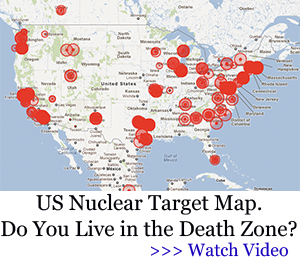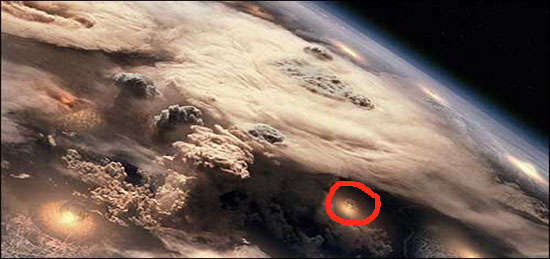Editor’s Note: This article is written by Professor Martin E. Hellman (Stanford University). The inevitability of a nuclear war is one of the reasons why we prep. Enjoy!
“Technology has given us powers that were traditionally reserved for gods: raising the dead, creating new life forms, and destroying the world. As the Mid-East (…) demonstrates, humanity’s social progress is far from god-like. This chasm between our technological development, on the one hand, and our social development, on the other, has created a recipe for disaster that demands urgent attention if the human race is to survive.” (Source)
“…while ending war is necessary for humanity’s long term survival, in the short term we need a strong military to deal with very real threats in a world that has not accepted that truth.” (Source)
Related: The 7 Lost US Nuclear Bombs That ISIS is trying to Get Their Hands On
by Professor Martin E. Hellman
Hiram Maxim, the inventor of the machine gun, declared, “Only a general who was a barbarian would send his men to certain death against the concentrated power of my new gun.” But send them they did. In World War One, the machine gun often mowed down tens of thousands of men in a single day.
Orville Wright saw a similar vision: “When my brother and I built and flew the first man-carrying flying machine, we thought we were introducing into the world an invention that would make further wars practically impossible.” Far from ending war, however, the airplane increased the ability to maim and kill. In firebombing raids on London, Hamburg and Tokyo the airplane wrought previously unimaginable levels of destruction. In a single night, March 9, 1945, 25 percent of Tokyo was destroyed, 80,000 people were killed, and over 1 million left homeless.
History shows the folly in hoping that each new, more destructive weapon will not be used. And yet we dare to hope that this time it will be different. We and the Soviets have amassed a combined arsenal of 50,000 nuclear weapons, equivalent in destructive force to some 6,000 World War II’s, capable of reaching their targets in a matter of minutes, and able to destroy every major city in the world. All in the belief that they will never be used.
But unless we make a radical shift in our thinking about war, this time will be no different.
On our current path, nuclear war is inevitable
The inevitability concept can best be understood by analogy to finance. It does not make sense to talk of an interest rate as being high or low, for example 50 percent or 1 percent, without comparing it to specific period of time. An interest rate of 50 percent per year is high. An interest rate of 50 percent per century is low. And the low interest rate of 1 percent per year builds up to a much larger interest rate, say 100 percent, when compounded over a sufficiently long time.
Related: 10 Things to Do on the Day The Economy Collapses
In the same way, it does not make sense to talk about the probability of nuclear war being high or low — for example 10 percent versus 1 percent — without comparing it to a specific period of time — for example, 10 percent per decade or 1 percent per year.
Having gotten the units right, we might argue whether the probability of nuclear war per year was high or low. But it would make no real difference. If the probability is 10 percent per year, then we expect the holocaust to come in about 10 years. If it is 1 percent per year, then we expect it in about 100 years.
The lower probability per year changes the time frame until we expect civilization to be destroyed, but it does not change the inevitability of the ruin. In either scenario, nuclear war is 100 percent certain to occur.
This pair of examples brings out a critically important point. Our only survival strategy is to continuously reduce the probability, driving it ever closer to zero. In contrast, our current policies are like repeatedly playing Russian roulette with more and more bullets in the chambers.
We have pulled the trigger in this macabre game more often than is imagined. Each action on our current path has some chance of triggering the final global war. And if we keep pulling the trigger, the gun will inevitably go off. Each “small” war – in Iran, or Iraq, or Afghanistan — is pulling the trigger; each threat of the use of violence – as in the Cuban missile crisis – is pulling the trigger; each day that goes by in which a missile or computer can fail is pulling the trigger.
The only way to survive Russian roulette is to stop playing. The only way to survive nuclear roulette is to move beyond war in the same sense that the civilized world has moved beyond human sacrifice and slavery.
When it was merely moral and desirable, it might have been impossible to beat swords into plowshares. Today, it is necessary for survival.
Gen. Douglas MacArthur said in his 1961 address to the Philippines Congress: “You will say at once that, although the abolition of war has been the dream of man for centuries, every proposition to that end has been promptly discarded as impossible and fantastic. But that was before the science of the past decade made mass destruction a reality. The argument then was along spiritual and moral lines, and lost. But now the tremendous evolution of nuclear and other potentials of destruction has suddenly taken the problem away from its primary consideration as a moral and spiritual question and brought it abreast of scientific realism.”
There is potential for this to be the best of times or the end of time, depending on which direction we take at this critical juncture in human evolution. Technology has given a new, global meaning to the Biblical injunction: “I have set before you life and death, blessing and curse; therefore choose life, that you and your descendants may live.”
To avoid extinction, we must take action to shift from an old mode of thinking which justifies war as necessary for survival to a new mode of thinking which recognizes war as the ultimate threat to survival.
You may also like:
 7 Actions to Take Immediately Following an EMP Strike
7 Actions to Take Immediately Following an EMP Strike
How An EMP Will Affect Your State (Video)
“I Powered my House During and After Hurricane Sandy.” – Learn How
24 Lost Survival Tips from 100 Years Ago – with Illustrations















While it’s true that at one time between the US and Russia we did amass an arsenal of 50,000 weapons, the current number now sits well below that at around 15 to 20 thousand. Still more than enough to destroy everyone and everything.
I, however, am a big supporter of the nuclear deterrent, it has been shown time and again that those countries who have nuclear weapons have NOT used them, and for all their blustering before hand, have actually calmed their rhetoric down.
And yes, there is always a chance that some event somewhere will lead to a false launch, but it is more likely that we as a civilization will destroy ourselves by other means far before that.
You are right… now there are actually around 18000 warheads… and active only 5000.
but here is the catcher on those 6 to 8 thou nukes the usa has ..each one is anywhere from 200 to 500 times more powerful than one of the 50 thou we use to have–do the math
Half of the stuff I click on here wants me to buy MORE books, newsletters, DIY books, investment subscriptions and those newsletters.
Furthermore, you will discover the usual activities that you just have to buy, wherever you’ll get great
prizes in the event you get.
Amman Arab academe is a Jordanian speculative
institute of vanguard education, located upon Jordan Street,
Mubis-Amman. Amman Arab academic world (AAU) was founded in 1997 under the well along Education Council
No. (1476) upon 24/11/1997 as a non-profit private university specialized in graduate studies under the proclaim Amman Arab academic circles for Graduate Studies, and thereby became the first academic circles in Jordan that offers graduate programs leading to Master’s Degrees,
and Doctoral Degrees. on 30/9/1998 the forward-thinking Education Council gave grant for the academic circles to begin practicing taking into consideration the
unchangeable No. (1625). Academic operation started
in the coming on of the Second Semester of the academic year
1999/2000. One of Jordanian Private Universites